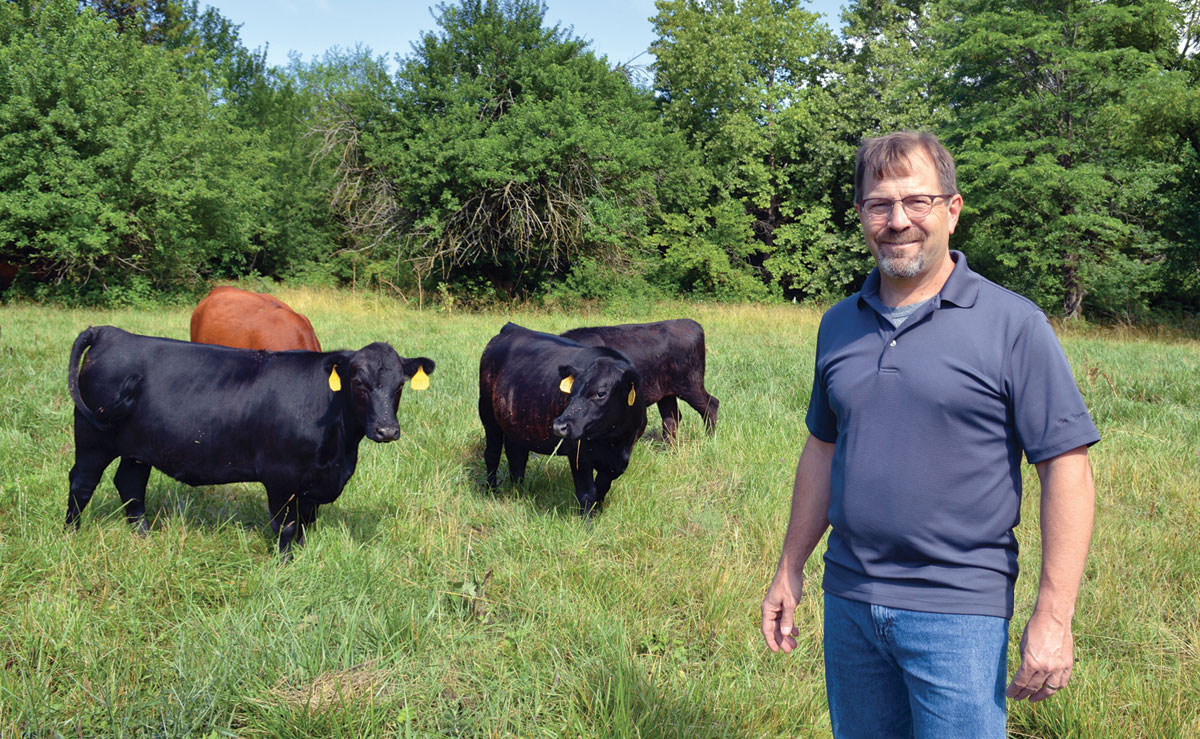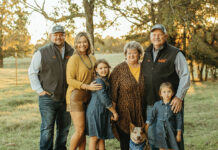
Bill and Stacey Shields have found their calling at Sunny Spring Farms
On a summer morning that feels fresh and bright after a night of much needed rain, Bill Shields drives across thoughtfully fenced pastures to a point overlooking gentle, rolling hills, a large pond and the back of his home.
“This is my happy place,” Bill Shields stated as he gazed at the scene in front of him. “This is a beautiful farm and we try to be good stewards of the farm. That is our mantra to be good stewards of the animals and good stewards of the land,” Bill added.
At many points in his life, Bill, a business owner specializing in aviation engineering, would have never thought he would be a farmer. Though he grew up helping his grandfather with row crops on a farm in Central Illinois, Bill’s career in the aviation industry flew him far from agriculture. But after selling one company and starting another, Bill looked to land and cattle as an investment.
In 2013, Bill and his wife, Stacey, purchased a 100-acre farm in Bois D’Arc, Mo. A beautifully preserved stone dairy barn from the 1930s sits on the property. A few stones gracing the front of the barn create two sunbursts, and a large spring runs through the acreage. The stone sunbursts on the barn and the spring in the land inspired the Shields to name their property – Sunny Spring Farms (SSF).
SSF focuses on raising grass fed- and finished-beef. The Shields purchased Angus-based commercial cattle to start their herd. But now they are transitioning to a registered Red Angus operation.
Bill discovered cattle with smaller frame scores work better for his program. “What we have learned is that the acreage doesn’t change and what a cow eats doesn’t change. A cow eats about 3 percent of its body weight,” Bill explained. “So if a 1,400-pound cow eats 42 pounds a day and a 1,000-pound cow eats 30 pounds a day; they both give you a calf, but you get to have 30 percent more cows on the same land.”
Bill’s ideal cow has a two to three frame score and weighs 1,000 to 1,100 pounds. “No, they won’t have quite as big of calves, but it doesn’t matter if we can wean more pounds per year,” Bill said. SSF manages 35 momma cows and more than a dozen heifers on its homestead, as well as backgrounding 23 steers on a 90-acre farm they own nearby.
In the beginning, the Greene County Soil and Water Conservation District (SWCD) helped the Shields transform their acreage into a rotational grazing operation. The rotational grazing system allows SSF to raise one cow/calf pair on every 2 acres.
“We get so much more use out of the land by using rotational grazing that it is just not even debatable,” Bill said.
The property is divided into 20 paddocks ranging in size from 3 to 5 acres. In the spring, when grass is plentiful, the larger of the paddocks are split in half. The cattle are moved every day except for in the winter months when SSF operates a strip grazing system. On Aug. 1, the Shields close some of the paddocks to stockpile grass for winter.
When strip grazing, the herd stays on 1 acre at a time. Every third day, the cattle receive hay if needed and on the fourth day the fence is moved to open up a fresh acre of pasture.
“Strip grazing is probably one of the smartest things we have done since we have been out here for the soil,” Bill stated. In the spring, the Shields use a 100-year-old steel harrow to work the concentrated manure back into the soil as fertilizer.
Last year, the Shields added mini paddocks around the point where four paddocks converge by a waterer. They utilized a new permanent fencing system to create single entry points to the waterers. A fly rub soaked with organic insect repellent and mineral oil hangs above each entrance. “We have changed our watering designs to include forced entries where they have to go under fly rubs to get water,” Bill explained.
The Shields fight weeds with strategic brush hogging and by fertilizing with chicken litter, which is high in phosphorus. They use only therapeutic dosages of antibiotics if an animal is sick. If an animal needs repeated medication, it is dropped from the farm’s meat program.
The Shields rely on the thoughtful oversight of Doug and Deb Lawyer, who provide the daily management of SSF, giving the Shields the time to run their other businesses. Though the farm has only been operating for five years, it is already being recognized for its innovative practices. The Greene County SWCD recently honored the Shields with the 2017 Grassland Farmers of the Year award.
“We are really, really blessed,” Bill reflected.






